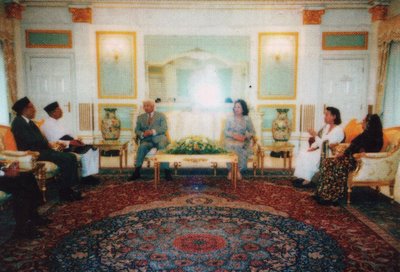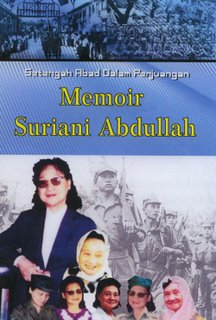Communist Eng Ming Ching memoirs out now
 The memoirs of veteran communist Suriani Abdullah aka Eng Ming Ching ( 应敏钦、‘亚敏’ ) , 82, is now out for public sale and circulation. Setengah Abad Dalam Perjuangan - Memoir Suriani Abdullah is published in Kuala Lumpur by SIRD (Strategic Information Research Development).
The memoirs of veteran communist Suriani Abdullah aka Eng Ming Ching ( 应敏钦、‘亚敏’ ) , 82, is now out for public sale and circulation. Setengah Abad Dalam Perjuangan - Memoir Suriani Abdullah is published in Kuala Lumpur by SIRD (Strategic Information Research Development).The Preface of the 243-page book is written by another veteran communist Rashid Maidin who confirms that Suriani had visited Malaysia twice and met members of her family after the signing of the 1989 Haadyai Peace Accords . Rashid Maidin also confirms that Suriani and her husband Abdullah C.D aka Abdullah Che Dat Anjang, who signed the 1989 Haadyai Peace Accords as the Chairman of the Communist Party of Malaya, were granted audience by HRH Sultan Azlan Shah of Perak (picture above - Suriani Abdullah in white attire on right).
Rashid Maidin himself is a signatory to the 1989 Peace Accords for and on behalf of the Communist Party of Malaya. Rashid was also one of the three CPM representatives to the 1955 Baling Peace Talk.
 Like Chin Peng, Suriani Abdullah, Abdullah C.D and Rashid Maidin were all born in various places in Perak.
Like Chin Peng, Suriani Abdullah, Abdullah C.D and Rashid Maidin were all born in various places in Perak.In Page 104 of Setengah Abad Dalam Perjuangan - Memoir Suriani Abdullah, a clear colour photograph of her and her husband meeting HRH Sultan Azlan Shah is published. It is reproduced here with the full consent given to this blogger by the memoirs' author Suriani Abdullah aka Eng Ming Ching.
Suriani Abdullah was born in Sitiawan in Perak as Eng Ming Ching. She attended Nan Hwa school in Sitiawan together with Chin Peng and also the Methodist Girls' School (MGS) in Ipoh.
She joined the underground Communist Party of Malaya in Ipoh in 1940 at the age of 16 and actively involved in organising and empowering women workers in the Kinta Valley and later, the anti-fascist guerilla MPAJA.
She was captured in Tanjung Tualang (the area where Rashid Maidin then worked as an electrical chargeman in a tin-mining dredge as well as an underground anti-fascist activist) by Japanese troops on 28 January, 1945 and sent to Ipoh for incarceration and severe torture. She survived the ordeal, trial and tribulation without compromising her ideal and principle.
 Immediately after war ended, she was seconded by the Communist Party of Malaya to the British Military Administration (BMA) in Perak as a people's representative. She also led the Allies' Victory Procession in Ipoh.
Immediately after war ended, she was seconded by the Communist Party of Malaya to the British Military Administration (BMA) in Perak as a people's representative. She also led the Allies' Victory Procession in Ipoh. She was then appointed a secretary of CPM's open offices in Ipoh, Kuala Lumpur and Singapore.
She was then appointed a secretary of CPM's open offices in Ipoh, Kuala Lumpur and Singapore.Now declassified British political and military intelligence refers her as 'Miss Eng Ming Ching'.
A portion of one such intelligence report written by Victor Purchell, a Chinese Affairs Officer of the British Military Administration (BMA) reads:
" She has quite a good figure beneath her dowdy blue cotton dress, but the fountain pen stuck in her bosom is a sharp reminder that she puts business before allurement.
" Her most remarkable features are her eyes. At one moment they are flat, brown and dull, at the next revealing in blateful flashes the smouldering fires of fanaticism ...
" I had heard much of her oratory and of her decidedly unfair behaviour at the meeting in October 1945 during the rice troubles when she had stood at a platform on the (Ipoh) Padang and had worked up the crowd of 3,000 with inflammatory speeches and by beating time for revolutionary songs by her trained choir for an hour or more before Brigadier Willan's arrival, so that when he came the crowd was in no mood to listen to reason.
" There she sat in front of me, and whilst I detected in the occasional flashes of her eyes the eternal Trioteuse and firebrand of the Revolution, she was surprisingly subdued during the interview ".
 In the Period of Peace Struggle between 1946 to 1948, she improved her command of Bahasa with the help of the legendary Indonesian Marxist Sutan Jenain @ Ma Ali who was also reportedly a member of CPM's central committee in 1936.
In the Period of Peace Struggle between 1946 to 1948, she improved her command of Bahasa with the help of the legendary Indonesian Marxist Sutan Jenain @ Ma Ali who was also reportedly a member of CPM's central committee in 1936.In 1947, she visited the newly independent Republic of Indonesia, lectured at the Madiun University, spoke on Radio Republik Indonesia in Jogjakarta and also met President Sukarno as well as Defence Minister Amir Shariffudin at the Presidential Palace in Jakarta. It was the policy of the Communist Party of Malaya at that time to support the Indonesian people's armed independence struggle, led by Sukarno and Dr.Mohamad Hatta, against Dutch colonialism.
 After the outbreak of the Anti-Colonial War in June 1948, Suriani went underground again.
After the outbreak of the Anti-Colonial War in June 1948, Suriani went underground again.In 1950s, she was proclaimed, in absentia, a Resistance Heroine of the Pacific War at an international conference in Beijing.
In 1975, she was elected a member of CPM's central committee for the first time.
She only reappeared in public view on 2 December 1989 as a VIP to the ceremony in Haadyai witnessing the signing of the Peace Accords between the Communist Party of Malaya and the governments of Malaysia as well as Thailand.
 In mid-1990s, Suriani and her husband Abdullah C.D were granted audience in a palace by HRH Sultan Azlan Shah of Perak. Later in 1999, they performed Haj at the Holy City of Mecca. In the same year, she published Rejimen Ke-10 Dan Kemerdekaan (Hong Kong, Nan Dao) , the official history of the all-Malay 10th Regiment. The MNLA and its successor (since 1983) Malayan People's Army (MPA) have been demobilised since 1989 in fullfilment of the Haadyai Peace Accords.
In mid-1990s, Suriani and her husband Abdullah C.D were granted audience in a palace by HRH Sultan Azlan Shah of Perak. Later in 1999, they performed Haj at the Holy City of Mecca. In the same year, she published Rejimen Ke-10 Dan Kemerdekaan (Hong Kong, Nan Dao) , the official history of the all-Malay 10th Regiment. The MNLA and its successor (since 1983) Malayan People's Army (MPA) have been demobilised since 1989 in fullfilment of the Haadyai Peace Accords. Now, Suriani and Abdullah live with their daughter Karimas @ Xiao Hong, son-in-law Inderajaya and granddaughter Meiliza at Ban Chulabhorn 12 in Sukhirin, southern Thailand. We met in her house on February 20 and 21, 2005 (picture with Rashid Maidin on right).
Now, Suriani and Abdullah live with their daughter Karimas @ Xiao Hong, son-in-law Inderajaya and granddaughter Meiliza at Ban Chulabhorn 12 in Sukhirin, southern Thailand. We met in her house on February 20 and 21, 2005 (picture with Rashid Maidin on right).She is reportedly still healthy, cheerful and sharp-minded because every morning, she walks around the kampung and enjoys listening to adik-adik's laughters to keep herself physically and psychologically fit.
Suriani, the resistance heroine
http://www.malaysiakini.com/opinionsfeatures/34828
Suriani tortured by Kempetai
http://www.malaysiakini.com/opinionsfeatures/34864
Eng Ming Ching on national unity (in Chinese)
http://www.malaysiakini.com/columns/42407
The titans of Malay communist leaders
http://www.malaysiakini.com/opinionsfeatures/34780
Rashid: Why I turned Red
http://www.malaysiakini.com/opinionsfeatures/34906
Rashid saved by Chinese cowherds
http://www.malaysiakini.com/opinionsfeatures/34946
Abdullah CD - CPM's Malay front
http://www.malaysiakini.com/opinionsfeatures/34989
Abu Samah - the ex-British child soldier
http://www.malaysiakini.com/opinionsfeatures/35027
History of the Malay Left
http://www.malaysiakini.com/opinionsfeatures/48827
Merdeka history in new light
http://www.malaysiakini.com/opinionsfeatures/42665
Two more CPM leaders publish memoirs
http://www.malaysiakini.com/news/42074
Alternative accounts of Malaya’s independence
http://www.malaysiakini.com/opinionsfeatures/40390
A tale of two Malay communist memoirs
http://www.malaysiakini.com/opinionsfeatures/33401
Utusan-UKM lock horns over CPM memoirs
http://www.malaysiakini.com/news/31784
Green light for new book on Chin Peng
http://www.malaysiakini.com/news/29271
Chinese edition of Chin Peng’s book gets official nod
http://www.malaysiakini.com/news/31751
Out-of-court settlement: Daily to serialise Chin Peng’s memoirs
http://www.malaysiakini.com/news/33018
Nanyang ‘cautioned’ against Chinese version of Chin Peng book
http://www.malaysiakini.com/news/28510
Chin Peng’s memoirs in Chinese out soon
http://www.malaysiakini.com/news/30708
The fairer side of Malayan communism
http://www.malaysiakini.com/opinionsfeatures/29792
Remembering the martyrs
http://www.malaysiakini.com/opinionsfeatures/22502
Said Zahari: Read Chin Peng’s memoirs with open mind
http://www.malaysiakini.com/opinionsfeatures/22390
Alias Chin Peng: My Side of History
http://www.mediamasters.com.sg/


3 Comments:
Terima kasih kerana menarik perhatian saya terhadap rencana ini.
Pada hemat saya, ramai rakyat memang mula sudah lupa siapakah Abdullah CD, Chin Peng, Rashid Maidin, Suriani Abdullah, Abu Samah dan lain-lain pejuang-pejuang anti-kolonial, sehinnga minat popular dihidup kembali oleh
orang-orang seperti GUNAWAN MAHMOOD secara lojik terbalik (reverse logic) atau paradoks. Selapas membaca rencana-rencana bodoh sombong mereka, rakyat yang tidak tahu sejarah pun tertanya-tanya: siapakah Abdullah CD, Chin Peng, Rashid Maidin, Abu Samah dan Suriani Abdullah yang Utusan Malayaia dan Berita Harian takutkan sangat ini? Adakah mereka datang dari Mars ataupun angkasa lepas? Dengan dinamik psikologi curiosity ini, maka FREE ADVERTISEMENT atau Iklan Percuma telah diberi kepada pejuang-pejuang anti-kolonial yang mula dilupakan orang ramai. Hehehe ... inilah dinamik psikologi yang GUNAWAN MAHMOOD tidak faham langsung.
Sebahagian besar daripada "kita" agaknya sudah lama dipengaruhi oleh propaganda penjajah, bahawa komunis (PKM) adalah pengganas, manakala askar dan polis adalah wira yang mempertahankan tanah air ini daripada ancaman pengganas, walaupun sebenarnya mereka hanyalah "tentera upahan" penjajah.
Oleh itu, apabila ada usaha untuk memperkenalkan nama-nama seperti Abdullah C.D.Rashid Maidin dll sebagai pejuang kemerdekaan, banyaklah orang yang tersentak dan mungkin tidak mahu percaya bagaimana "penggans komunis" ini boleh dianggap sebagai pejuang kemerdekaan.
Dalam hal ini, sejarah memang perlu ditafsir semula.Kita tidak boleh selamanya berpegang pada "tafsiran rasmi" , yang menganggap orang-orang PKM adalah pengganas, dan bukan pejuang kemerdekaan.
Sebenarnya mereka pun ada sda saham yang besar dalam perjuangan kemerdekaan.
Kalau mereka tidak berjuang secara senjata, dan tidak menjadi musuh utama kepada kerajaan penjajah, kerajaan penjajah mungkin belum perlu memberi kemerdekaan kepada negara ini pada 31 Ogos 1957. Mungkin penjajahan akan berterusan,kerana orang Melayu masih "setia" kepada penjajah.
Akan tetapi, kerana adanya "pengganas komunis", Parti Perikatan pimpinan Tengku dapat menggunakannya sebagai alasan untuk menuntut kemerdekaan. Dengan itu, jika negara ini diberi kemerdekaan, PKM sudah "kehilangan alasan" untuk meneruskan perjuangannya.
Kerajaan British pula memang menghadapi tekanan yang berat dari perjuangan bersenjata yang dilancarkan oleh PKM,khasnya dari segi perbelanjaan untuk pertahanan. Ini juga memaksa kerajaan British mempercepat pemberian kemerdekaan.
Oleh itu, para pemimpin PKM mestilah diberi pengiktirafan sebagai pejuang kemerdekaan (di samping orang-orang lain) sebelum atau sesudah mereka.
Bukan sahaja sebahagian daripada Melayu yang setia kepada penjajah, sebahagian daripada taukeh-taukeh besar Tionghua yang cenderung kepada puak kanan Kuomintang yang korup dulu pun ada yang tidak sedar diri dan pro-penjajah. Mereka juga tidak mahu kemerdekaan. Puak Kiri dan Puak Kanan wujud di masyarakat semua kaum. Bacalah Chin Peng's My Side of History untuk memahami cara berfikir puak kanan masyarakat Tionghua.
Post a Comment
<< Home